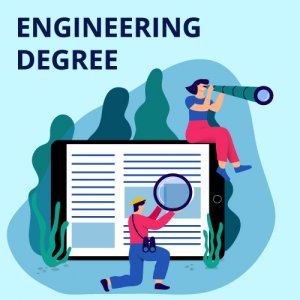What Kind of Accreditation Should My Degree Program Have?
To be sure that future employers will be interested in your degree, it is important to know that your school has the appropriate accreditation.
For any higher education discipline, particularly for Engineering, accreditation is crucial when choosing an institution.
The college or university is eligible for financial support if the Department of Education has recognized an association that provided the accreditation.
First of all, accreditation shows that an educational institution adheres to the standards.
Secondly, the program is relevant and continues to expand in its field.
There are institutional and programmatic accreditation processes.
One is required for schools, the other for a specific discipline and degree program.
Regional Accrediting Agencies
Regional and national accreditation agencies can provide institutional accreditation.
In short, regional accreditation agencies enhance reputation and credibility.
When studying the conditions of colleges and universities, it is advisable to obtain a “stamp of approval” from one of these accreditation agencies depending on the region:
The Higher Learning Commission
Middle States Commission on Higher Education
New England Association of Schools and Colleges
Northwest Commission on Colleges and Universities
Southern Association of Colleges and Schools Commission on Colleges
Western Association of Schools and Colleges
Program Accreditation
As regards national accreditation agencies, the situation is different.
Sometimes, an accreditation agency that specializes in a specific program is important.
Some employers require you to obtain a degree in a specific program from a national accreditation course.
One of these professions is engineering.
If you want to use your degree to become a licensed professional engineer and you will need a degree with accreditation.
For your major, accreditation by the Accreditation Board for Engineering and Technology (ABET) is preferred.
It is not a commercial accreditation agency for programs in the fictional and natural sciences of computing and engineering technologies.
Abet has confirmed quality control of 3800 programs in more than 77 educational institutions in 31 countries.
The first step for those who want to become a professional automotive engineer is to search for a program with accreditation by ABET.
This important document will confirm your qualifications when seeking employment in a competitive labor market.
To determine accreditation status, you simply need to contact the chosen school.
Chiefly, the database of the Department of Education contains all accredited companies within its competence.
If you know about accreditation, you can consider several options for obtaining a degree.
What Kinds of Engineering Degrees Are There?
Associate Degree in Engineering
Like other study programs, obtaining an engineering degree requires 60 credits, which means 2 years.
It offers entry-level subjects such as basic physics engineering principles and higher mathematics.
You can start your career in this field and work as a consumer goods tester, for example, as a mechanical technician or even as a researcher.
However, in order to be licensed as a professional engineer, you must have a bachelor’s degree.
What Courses Will You Take?
- Engineering & Construction
- Calculus
- Information Systems
- Physics
- Chemistry
Bachelor of Engineering
Often, a bachelor’s degree in technical science and a professional engineering license are required to obtain a post of a senior technical specialist.
Usually, it’s a 120 credit program covering 4 years.
A bachelor’s degree will provide employment opportunities in a variety of modern fields, such as transport, health care, informatics, and architecture.
In addition to introductory courses in mathematics and science, you will also study in more detail several areas of specialization, including aeronautical mechanics, civil engineering, medical technology and other areas of specialization.
Therefore, it will be easier for you to determine the areas of interest.
A bachelor’s degree from an accredited lunch program is a mandatory requirement if you want to work as a professional engineer.
After all, it’s necessary to pass the exams to get a license.
It is worth noting that some schools offer to combine bachelor and master programs in one five-year program. This is a good way to save time and money. If you want to continue studying and get a master’s degree, find out if there is such an option in your school.
What Courses Will You Take?
- Engineering and Technology
- Engineering and Programming
- Principles of Electricity
- Thermodynamics
- Computer-Aided Design
- Measurement Systems
- Fluid Mechanics
- Chemistry Lab
What’s the Difference Between a BA and a BS in Engineering?
Both programs offer almost the same specialization in mathematics and science.
The only difference is that Bachelor of Arts (BA), unlike a Bachelor of Arts (BA), offers an additional choice of humanities subjects.
And bachelor of Sciences (BS) in engineering has a bias in scientific and mathematical disciplines.
Master of Engineering
Generally, the institution provides general master’s degree programs.
Although there is a possibility that your degree will apply to the direction you choose.
The objective of the Master’s Programme is to develop knowledge and research skills in various fields, including civil engineering, chemical engineering, and electrical engineering, aviation engineering, etc.
If you want to realize leadership qualities and your technical skills at the same time, you should consider obtaining a diploma of engineer manager.
Regardless of your chosen course of study, you will spend time in advanced math and laboratory work
based on this, you will need to write a senior thesis at the end of the program.
This program lasts 2 years and your school can give you the opportunity to continue your bachelor’s or master’s studies for 5-6 years, so you can save money and time.
What Courses Will You Take?
- Engineering Management
- Methods of Applied Mathematics
- Experimental Engineering
- Robotics
- Computer Integrated Manufacturing
- Energy Systems Design
- Intro to Aerospace Engineering
- Mechatronics
Ph.D. of Engineering
If you are interested in working as a researcher or university professor, you will need to obtain a doctorate in engineering.
For that, you need to have a Master’s degree in Engineering or related fields.
This program requires 3 to 6 years of training During this time, you will conduct your own research and consult with your mentor.
Upon completion of the training, you will be qualified to assist in promoting research in your field for a government project, a private enterprise, a non-profit think tank at the university, and so on.
What Kind of Licensing or Certification Do You Need?
To become an engineer in Engineering you should have a government license.
If you want to become a licensed professional engineer (PE), you must first obtain a bachelor’s degree in engineering from a program accredited by ABET.
For those, who have received this degree, the National Council of Examiners for Engineering and Surveying examiners conducts an engineering Fundamentals of Engineering (FE) exam.
The license allows you to work in public places as an engineer.
Obtaining the title of professional engineer takes 4 years.
After that, you have to take an examination to determine the principles and application of engineering.
Then you’ll get a full license as a professional engineer (PE).
This status opens up a huge range of professional opportunities.
Some states may require permanent education to maintain this status so that it can vary from state to state.
You can also consider other special certificates for your direction.
Certificates of system design, technical maintenance, information technology will increase your reliability in the eyes of your employer.
Popular Degree Programs
What Can You Do With This Degree?
Here’s a list of the most popular professions in the field:
- Aerospace Engineering and Operations Technicians
- Aerospace Engineers
- Agricultural Engineers
- Biomedical Engineers
- Cartographers and Photogrammetrists
- Chemical Engineers
- Civil Engineering Technicians
- Civil Engineers
- Electrical and Electronic Engineering Technicians
- Electrical and Electronics Engineers
- Electro-Mechanical Technicians
- Engineering Managers
- Environmental Engineers
- Health and Safety Engineers
- Industrial Engineering Technicians
- Marine Engineers and Naval Architects
- Materials Engineers
- Mechanical Engineering Technicians
- Mechanical Engineers
- Mining and Geological Engineers
- Nuclear Engineers
- Petroleum Engineers
- Sales Engineers
- Surveying and Mapping Technicians
- Surveyors
How Much Can You Make With This Degree?
Certainly, in engineering, your level of education has a direct impact on your potential job and salary.
The frequency also depends on the chosen professional direction.
According to the Bureau of Labour Statistics, the number of engineering and technical jobs is growing steadily, and in some special sectors, there is indeed rapid growth.
Average annual salaries for leading specialists in some areas are as follows:
- Surveying/Mapping Technicians — Mean annual wage of $44,380
- Civil Engineer Technicians — Mean annual wage of $52,580
- Industrial Engineering Technicians — Mean annual wage of $55,460
- Drafters — Mean annual wage of $55,550
- Mechanical Engineer Technicians Mean annual wage of $56,250
- Surveyors — Mean annual wage of $62,580
- Electrical Engineer Technicians — Mean annual wage of $64,330
- Landscape Architects — Mean annual wage of $68,230
- Agricultural Engineers — Mean annual wage of $77,110
- Architects — Mean annual wage of $79,380
- Civil Engineers — Mean annual wage of $86,640
- Industrial Engineers — Mean annual wage of $87,040
- Mechanical Engineers — Mean annual wage of $87,370
- Environmental Engineers — Mean annual wage of $87,620
- Biomedical Engineers — Mean annual wage of $88,550
- Health and Safety Engineers — Mean annual wage of $89,130
- Mining/Geological Engineers — Mean annual wage of $92,250
- Materials Engineers — Mean annual wage of $92,390
- Marine Engineers — Mean annual wage of $92,560
- Electrical Engineers — Mean annual wage of $99,070
- Chemical Engineers — Mean annual wage of $104,910
- Nuclear Engineers — Mean annual wage of $107,600
- Computer Hardware Engineers — Mean annual wage of $114,600
- Aerospace Engineers — Mean annual wage of $115,220
- Petroleum Engineers — Mean annual wage of $137,170
What Professional Associations or Societies Should You Join?
The best way to establish new connections in your field is to join a professional association.
Here you can also learn about useful seminars or contests and improve your personal knowledge.
Obviously, your chosen career path will determine which associations you decide to join.
Find out about EngineeringAssociations that match your professional direction:
- Accreditation Board for Engineering and Technology, Inc. (ABET)
- American Society of Civil Engineers (ASCE)
- National Society of Professional Engineers (NSPE)
- American Society of Mechanical Engineers (ASME)
- America Society for Engineering Education (ASEE)
Summary
Now you have a more particular vision of your Engineering career.
Choose your own path and start applying your talents in work.
The degree in Engineering allows you to choose one or more interesting directions.
It’s a great opportunity to realize your technical potential and make your invention
See More Degrees
What can you do with a degree in...







